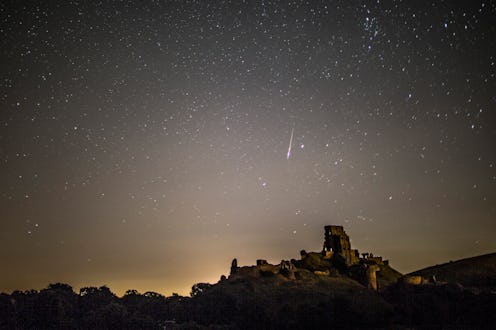Although I live in New York City, my family lives in a suburban town in North Carolina, where there are plenty of fields with limited lighting. Since the Geminid meteor shower is almost here, I'm even more excited to go back home this month — the same time as when the Geminid meteor shower is going to occur. Even though there have been plenty of meteor showers and other exciting celestial events that took place this year, the only one I got to experience was the Black Moon, and honestly, there wasn't much to see there. So I'm really glad that there's this one last chance for me (and you!) to catch a glimpse of some shooting stars before 2016 is over.
The Geminid meteor shower has one of the prettiest meteor shower names, if you ask me. It's named because the meteors actually come from the constellation called Gemini. But that doesn't mean you have to only stare at certain parts of the sky to see them; the meteors will fall across the sky in many different directions. There is one caveat, though: Not everyone will be able to see the meteor shower. People who live in the Northern Hemisphere will have the best chance of seeing the meteors, although those in the Southern Hemisphere might see some as well.
For those who like to plan things out ahead of time, the Geminid meteor shower will begin in the middle of December and peak on the night of Dec. 13 through very early morning on Dec. 14 — that's the time frame when you're likely to see the most meteors. The meteor shower will mostly have died down by Dec. 16. It may be quite chilly depending on where you are, so bring a wool blanket (or several) or even start a small fire. Consider making a group outing or cuddle fest with a significant other so you aren't just freezing outside on your own.
I should also mention that this is the perfect meteor shower for night owls, since the best time to watch it is very late at night, ideally 2 a.m. local time. However, consider reaching your viewing location a couple of hours beforehand in order to get situated. If you hate staying up late, you'll probably want to take a nap in the afternoon first.
I'm stoked about the Geminid meteor shower not just because I'll be home in time to see some falling stars, but also because 100 meteors are expected to fall per hour. 100 meteors! That's quite a lot for a meteor shower, so needless to say, the Geminid meteor shower is one of the brightest of them all. (Word has it that a super moon will also be shining during the meteor shower, which might make the meteors a little harder to see because of the additional light, but hopefully it won't interfere too much.) There's nothing like a meteor shower to make this holiday season feel extra special. Even if you aren't on holiday by the time Dec. 13 rolls around, you should still try to get out and spot at least a few meteors before bedtime. After all, it's one of the last meteor showers of 2016!
Bottom line is, if you love a good star show, the Geminid meteor shower is one you won't want to miss. Don't forget your binoculars!
Images: Giphy
